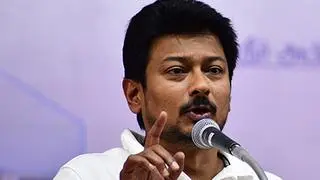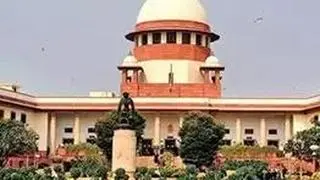In what is widely perceived as an indication for a shift of the financial year, Prime Minister Narendra Modi today urged States to consider January-December fiscal instead of the current April-March.
Stating that in a country where farm income is exceedingly important, Modi said budgets should be prepared immediately after the receipt of agricultural income for the year.
The Prime Minister was speaking at the closing session of the third Governing Council meeting of the NITI Aayog here on Sunday.
Modi said that as a former chief minister, he is convinced that the vision of a ‘New India’ can only be realised through the combined effort and cooperation of all States.
He urged the States, all local bodies and non-governmental organisations to decide on goals for 2022, and work in mission mode towards achieving them.
The Prime Minister said that the vision document in circulation is a draft, and all suggestions given by chief ministers will be taken into account before finalising it. He laid emphasis on good governance and said it leads to optimum utilisation of resources even if they are limited. Modi noted the issue of regional imbalance raised by a number of chief ministers. He agreed that this has to be addressed on a priority basis, both at the national and State levels.
Simultaneous electionsBriefing media persons NITI Aayog Vice-Chairman Arvind Panagariya said the Prime Minister called for carrying forward the debate and discussion on simultaneous elections.
Stressing the importance given to the views of the chief ministers, Modi had noted that it was the first time that the heads of State governments had been asked to recommend the list of Centrally-sponsored schemes and the funds sharing pattern. And, despite funding constraints, Modi said the recommendations were accepted.
The Prime Minister said there has been a 40 per cent increase in the overall fund allocation to States between 2014-15 and 2016-17. The percentage of funds tied to Central schemes has declined.
Modi said that the NITI Aayog is working on a 15-year long-term vision, a seven-year medium-term strategy, and a three-year action agenda. Panagariya gave an outline of the draft ‘action agenda’, which had been prepared with inputs from the States. He noted that over 300 specific action points had been identified, covering the gamut of sectors.
The period of the action agenda coincided with that of the 14th Finance Commission’s award, giving stability to the funding estimates of both the Centre and the States.
Discussions centred aroundchannelling expenditure towards health, agriculture and rural economy. On the Goods and Services Tax, the States were urged to pass the enabling legislation at the earliest.
Chief ministers conspicuous by their absence were West Bengal’s Mamata Banerjee and Punjab’s Amrinder Singh.








Comments
Comments have to be in English, and in full sentences. They cannot be abusive or personal. Please abide by our community guidelines for posting your comments.
We have migrated to a new commenting platform. If you are already a registered user of TheHindu Businessline and logged in, you may continue to engage with our articles. If you do not have an account please register and login to post comments. Users can access their older comments by logging into their accounts on Vuukle.